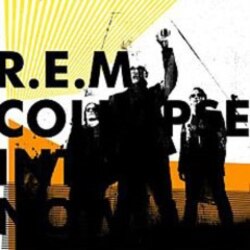DOUG JOHNSON: Welcome to AMERICAN MOSAIC in VOA Special English.
(MUSIC)
I'm Doug Johnson.
This week, we play R.E.M.’s new album, “Collapse Into Now,” and read a few comments about some of our recent shows.
But first, we tell about writer Deborah Eisenberg, the winner of the 2011 PEN/Faulkner award for fiction.
(MUSIC)
Deborah Eisenberg
DOUG JOHNSON: The writer Mary Lee Settle established the PEN/Faulkner Award for fiction in nineteen eighty. She wanted to create a national prize that was judged by writers and was free of commercial interests.
Mary Lee Settle died in two thousand five. But the yearly award she founded continues to support American writers. Faith Lapidus tells about this year’s winner.
FAITH LAPIDUS: Short story writer Deborah Eisenberg says there is always a terrifying moment as she nears completion of a story. She told a reporter that when she is almost done she will say to herself, is this story going to work or is it going to fall apart?
She also said that after she writes the last word, she goes back later, re-reads the story and then writes a new version.
That writing process created a book that just won the 2011 PEN/Faulkner Award. “The Collected Stories of Deborah Eisenberg” includes stories from all four of the writer’s books. Judge and fellow writer Laura Furman praised Eisenberg’s writing for its sharp intelligence and inventiveness. She said the author shows an understanding of the connectedness of human beings as it exists in isolation.
Deborah Eisenberg did not begin writing until she was thirty. She says she started writing because she had quit smoking. Her first story, “Days,” was the result.
Now sixty-five, Deborah Eisenberg also teaches at the University of Virginia in Charlottesville. She lives with actor and writer Wallace Shawn in New York City.
In two thousand nine Deborah Eisenberg won a MacArthur Fellowship and a Guggenheim Fellowship for her work. On May seventh, the PEN/Faulkner Foundation will honor her with its award for fiction and a fifteen thousand dollar prize.
The ceremony will also honor the other four finalists. They are Jennifer Egan for her book, “A Visit from the Goon Squad,” and Brad Watson for “Aliens in the Prime of their Lives.” The other two finalists are Jaimy Gordon, author of “Lord of Misrule” and Eric Puchner for “Model Home.” Each finalist will receive five thousand dollars.
Comments
DOUG JOHNSON: This week we take a look at some of your comments about recent programs. We will return to listener questions next week.
Many of you wrote to us about the tragic Triangle Factory fire in New York City. Hadi from Senegal is a technical director of a factory. He said the Triangle history influenced him greatly in his work.
Robert in Brazil had a similar message:
“I’m a Safety Technician working on Petrobras Brazil. [The] message [was] very interesting. Safety must be a personal treasure in our life.”
Seiko of Japan was shocked by the blocked doors, and lack of fire safety equipment in the Triangle Factory. Seiko wrote there was a similar fire in Kabukicho, Japan in two thousand one:
“The building had a fire alarm apparatus but the switch was turned off because of poor maintenance. Forty-four people died in the fire.”
Jean wrote in honor of the memory of the one hundred forty six factory workers who died in the Triangle Factory:
“I give my greatest respects and appreciations to people who sacrificed in the fire. Because of them we have a safer workplace and a better world.”
Our story about the Grammy Awards also received a lot of comments. Many of you enjoyed the music of jazz artist Esperanza Spalding who won the Grammy for best new artist. Nataly of Russia sent this message:
“Esperanza Spalding is brilliant! I’m happy to learn that her talent is appreciated with the award. Her performance is definitely a piece of Art.”
Many wrote in to praise Justin Bieber and Lady Gaga also. But not everyone liked the music in the story. Louis of China had this to say:
“Maybe it is that I was old, I don’t like to listen [to] the songs of nowadays. I think [they] are not as perfect as those traditional popular songs.”
Erika of Indonesia agreed:
“The music and the songs can not reach my feelings to listen to it more and more.”
Finally, we had an interesting note from Japan about our program last week about International Women’s Day. Maki wrote to say she was mostly happy for the changes for women but…
“Thanks to our ancestors, I'm glad that women's status has been improved than before. But in my country we have some customs left for women. From now on, I hope men also share more household chores [like] raising our children.”
Please keep sharing your opinions and questions at our website voaspecialenglish.com or on Facebook and Twitter at VOA Learning English.
R.E.M. “Collapse Into Now”
DOUG JOHNSON: The rock band R.E.M. has been making music for thirty years. The band recently released its fifteenth record, “Collapse Into Now.” Many critics have praised it as R.E.M.’s best album in the past ten years. Others say the songs are too similar to the band’s past hits. R.E.M. says it is their best album in twenty years. Shirley Griffith helps us decide for ourselves.
(MUSIC)
SHIRLEY GRIFFITH: That was the song “Discoverer.” Like many R.E.M. songs, this one is poetic with a meaning that is not always clear.
Lead singer Michael Stipe has said this song is influenced by an experience he had in New York City, where he lives. He said he was walking on Houston Street and was suddenly very moved by the energy of the city and its people.
Michael Stipe is known for his interest in many subjects outside of music. He is also a movie producer, activist, photographer and artist. Here is the song “Oh My Heart.”
(MUSIC)
The album “Collapse Into Now” contains songs with many different styles, from energetic rock to moving slow songs. One critic noted that it celebrates both the band’s past and its present. We leave you with ÜBerlin.
(MUSIC)
DOUG JOHNSON: I’m Doug Johnson. Our program was written by Dana Demange and Caty Weaver who was also the producer.
You can get transcripts, MP3s and podcasts of our shows at voaspecialenglish.com. You can also find us on Facebook and Twitter at VOA Learning English. If you have a question about American life, write to mosaic@voanews.com. We might answer your question on this show. So please include your name and country.
Join us again next week for AMERICAN MOSAIC, VOA’s radio magazine in Special English.






